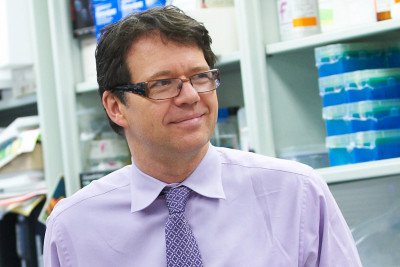
Michel Sadelain, Director of the Center for Cell Engineering
A team from Memorial Sloan Kettering has reported a new technique that could allow the development of more-specific, cell-based immune therapies for cancer. These types of treatments — which make use of patients’ own immune cells that have been enhanced in the laboratory — have shown some early success in the treatment of blood cancers including certain types of leukemia.
For most cancers, however, cell-based therapies have been harder to develop, in large part because it has been difficult for investigators to train immune cells to attack cancer cells without damaging normal, healthy cells in the body.
“We are getting better at working with patients’ immune cells and enhancing them so that we can get a powerful immunological response against cancer,” says Michel Sadelain, Director of Memorial Sloan Kettering’s Center for Cell Engineering, who led the study. “The dilemma now is that we are concerned with limiting these responses and making them as targeted as possible to avoid potentially harmful side effects. This new study helps us move toward that goal.”
“As Targeted as Possible”
The treatment approach, known as adoptive cell transfer (ACT), involves engineering an immune cell called a T cell. Also called T lymphocytes, T cells are a type of white blood cell. They work by recognizing specific antigens — proteins on the surfaces of invading cells — and mounting an immune response against these invaders.
In the ACT process, T cells are removed from a patient and a gene is added to allow the T cells to recognize a certain antigen on the surface of a cancer cell. The enhanced T cells are grown in the laboratory and then infused back into the patient to seek out and attack cancer cells.
Cancer cells overproduce certain antigens, which can help T cells to recognize them, but those same antigens are often found in lower levels on healthy cells. “There are very few antigens, if any, that are found only on cancer cells,” Dr. Sadelain explains. This means that T cells engineered to recognize a certain antigen could attack normal cells that have that same antigen as well.
“Now we are bringing in a completely new concept,” he adds. “If there is no single unique antigen that is found on the surface of the cancer cell we want to target, we instead create T cells that recognize two different antigens found on the tumor cell — a signature that will be unique to that type of cancer — and only attack cells with both antigens, sparing the normal cells that express either antigen alone.”
Balanced Signaling
The new technique makes use of two kinds of receptors: chimeric antigen receptors (CARs), which allow T cells to target antigens on the surface of a tumor cell, and chimeric costimulatory receptors (CCRs), which allow T cells to recognize a second antigen.
The CAR and the CCR work together through a process known as balanced signaling, in which the presence of either antigen on its own is not enough to trigger the immune response. Only tumor cells that carry both antigens will be targeted.
In the study, which was published online December 16 in Nature Biotechnology, the team created T cells that carried receptors for two antigens found in prostate cancer cells: a CAR for an antigen called PSMA and a CCR for an antigen called PSCA. The investigators then generated mouse models of prostate cancer and infused the mice with the engineered cells. They found that the T cells attacked only tumors that carried both antigens. The study’s first author was Christopher Kloss, a graduate student in the Weill Cornell Graduate School of Biomedical Sciences who is a member of Dr. Sadelain’s laboratory.
“We are the first to test this concept and show that it works,” Dr. Sadelain concludes. “We plan to develop clinical trials based on this approach, although we have not yet decided whether the first study will be a trial for prostate cancer or for a different type of cancer using two other antigens. Ultimately, our goal is to create targeted immunotherapies that are both potent and safe for patients.”

